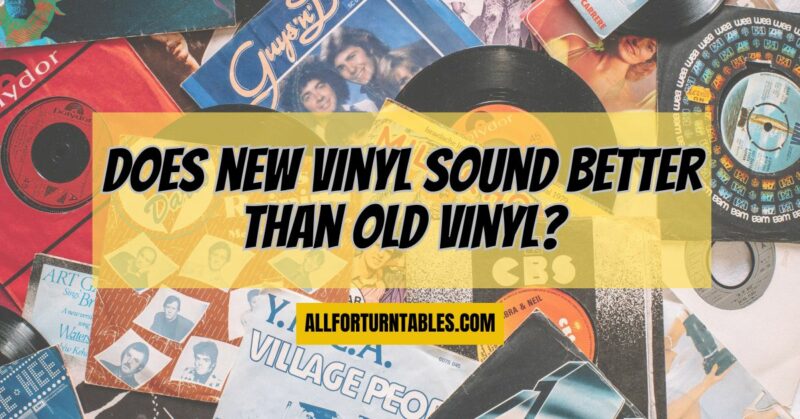Vinyl records, once considered a relic of the past, have seen a remarkable resurgence in popularity in recent years. As vinyl enthusiasts, collectors, and audiophiles continue to grow in number, a recurring question in the world of vinyl is: Does new vinyl sound better than old vinyl? In this comprehensive exploration, we will embark on a sonic journey to examine the factors that influence the sound quality of vinyl records, both old and new, and shed light on whether modern vinyl can genuinely surpass the audio quality of vintage classics.
The Resurgence of Vinyl
Before we delve into the debate, it’s important to understand the context behind the resurgence of vinyl.
- Analog Appeal: Vinyl records offer a unique analog listening experience that digital formats can’t replicate. The warmth and depth of analog sound have been a significant draw for vinyl enthusiasts.
- Tangible Experience: Handling a vinyl record, placing the needle on the groove, and enjoying the album artwork provide a tactile and immersive connection to the music that digital streaming can’t match.
- Collector’s Charm: Vinyl records, both old and new, have become coveted collector’s items. Limited editions, colored vinyl, and unique packaging make vinyl an attractive choice for collectors.
New Vinyl Records: Pros and Cons
Let’s begin by examining the pros and cons of new vinyl records in terms of sound quality.
- Sound Quality: New vinyl records can offer excellent sound quality, but it varies depending on factors like the source material and mastering process. Some modern releases are mastered from digital sources, which can influence the sound.
- Variety of Music: New vinyl releases provide access to a wide range of contemporary music, including recent releases and emerging artists. If you want to explore the latest music in vinyl format, modern records offer the most options.
- Advancements in Manufacturing: Modern vinyl benefits from improved materials, manufacturing processes, and quality control. This can lead to quieter backgrounds, reduced surface noise, and better consistency in sound quality compared to vintage records.
Old Vinyl Records: Pros and Cons
Vintage vinyl records, especially those from the analog era, come with their own set of attributes that influence their sound quality.
- Analog Sound Authenticity: Vintage records are celebrated for their authentic analog sound. Audiophiles often praise the warmth, depth, and character of vintage pressings, which were often mastered in analog and designed to be played on analog equipment.
- Collector’s Value: Vintage records, particularly those associated with iconic artists or limited editions, can hold significant collector’s value. The scarcity of certain vintage pressings adds to their allure.
- Nostalgia and Authenticity: Vintage vinyl records offer a sense of nostalgia and authenticity, transporting listeners to the era when the music was originally released. This emotional connection enhances the listening experience.
- Condition and Rarity: Finding vintage records in excellent condition can be a challenge, but well-preserved vintage vinyl can deliver exceptional audio fidelity.
Listener’s Role and Equipment
In the quest for audio quality, the listener’s role and equipment play a crucial role.
- Equipment Quality: The quality of the turntable, tonearm, cartridge, amplifier, and speakers can significantly impact the playback of vinyl records. High-quality equipment is essential for extracting the finest details from vinyl grooves.
- Subjective Experience: Sound quality is subjective and influenced by individual preferences, hearing acuity, and the listening environment. What sounds exceptional to one listener may not have the same impact on another.
- Setup and Care: Proper setup of the turntable, precise cartridge alignment, and meticulous maintenance of records are fundamental for achieving the best possible audio fidelity, regardless of whether the vinyl is old or new.
The Ultimate Question: Does New Vinyl Sound Better Than Old Vinyl?
The answer to this question is not straightforward and often depends on various factors, including personal preferences, the condition of the vinyl, and the quality of the playback equipment.
- Source Material: The quality of the source material, whether analog or digital, significantly influences the sound of both old and new vinyl records. Well-mastered analog source material is more likely to produce an authentic analog sound, while digital sources may introduce a different sonic character.
- Manufacturing Advances: Modern vinyl records benefit from advancements in materials and manufacturing processes, resulting in better quality control and potentially lower surface noise. However, these improvements may not always translate to a “better” sound for everyone.
- Listener’s Subjectivity: Sound quality is highly subjective, and what one person considers superior may not align with another’s preferences. Some audiophiles prefer the authentic analog warmth of vintage vinyl, while others appreciate the convenience and consistency of new records.
Conclusion
The debate over whether new vinyl sounds better than old vinyl is deeply rooted in personal preferences, collector’s goals, and the listening experience. Each type of vinyl, whether old or new, offers a unique connection to the music and the culture of its time.
Ultimately, the pursuit of audio quality in vinyl records should be guided by individual taste and goals. Whether you are a vinyl purist seeking the authentic analog warmth of vintage classics or a modern enthusiast enjoying the convenience and diversity of new vinyl releases, both old and new records have their place in the world of vinyl collecting.
Embrace the diversity of options available in the vinyl world, explore your personal preferences, and let your vinyl collection be a testament to your unique journey through the rich and enduring tapestry of analog music on vinyl.


